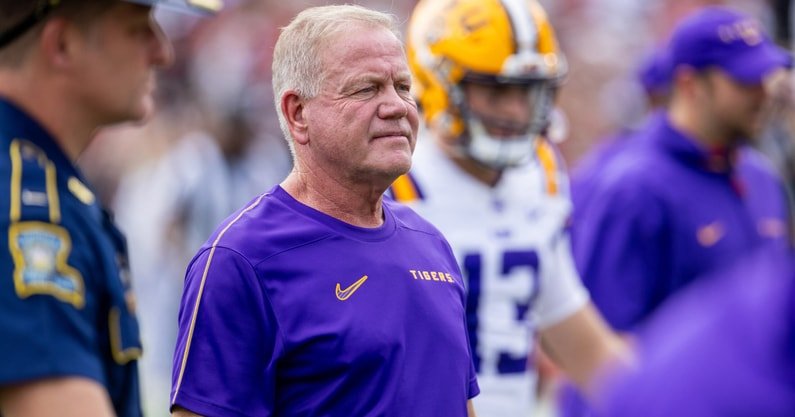Brian Kelly believes ‘adjustment’ to College Football Playoff will come in 2025
Brian Kelly’s Vision for College Football Playoff Adjustments in 2025
As the landscape of college football continues to transform with evolving dynamics across conferences, playoff formats, and team competitiveness, LSU Tigers head coach Brian Kelly has articulated his insights on the anticipated adjustments to the College Football Playoff (CFP) system expected in 2025. With significant changes on the horizon, Kelly’s perspective serves as a crucial lens through which to examine the future of college football, its impact on conferences, and the implications for student-athletes and coaches alike.
#### Background: A Brief Overview of the Current Playoff System
The College Football Playoff, established in 2014, has been a subject of intense scrutiny and debate since its inception. Designed to replace the previous Bowl Championship Series (BCS), the CFP allows a select four teams to compete for the national championship based on a combination of committee rankings and performance metrics. Over the past few years, however, criticisms have emerged regarding the system’s ability to foster inclusivity, equitable access for smaller programs, and overall competitiveness, particularly among Power 5 conferences.
With only four teams in contention, many believe the format disenfranchises several deserving programs, rendering the term “Playoff” somewhat misleading. As these discussions heated up, the announcement in 2021 of a significant expansion from four to twelve teams starting in the 2024 season sparked widespread excitement along with a multitude of questions.
### Kelly’s Insights on Future Adjustments
In a recent press conference, Brian Kelly shared his thoughts on how the College Football Playoff will likely evolve by 2025. Centering his discussion on player welfare, competitive balance, and the attention to detail in scheduling, Kelly laid out his vision for a playoff system that could successfully address some of the ongoing criticisms while maximizing the quality of the college football experience.
#### 1. **Focus on Player Welfare and Health**
Kelly emphasized that any adjustments to the existing playoffs must also consider the physical and mental well-being of student-athletes. With the grueling nature of college football, extending the playoff format and competition inevitably raises concerns about player fatigue and injury risks.
“The players are the ones who bear the brunt of these decisions,” Kelly remarked. “We need to ensure that whatever changes we make, we’re prioritizing their health above all else. Limiting the toll on their bodies while enhancing the competition could help shape the future of college athletics.”
This perspective reflects a growing consciousness among coaches and administrators on the importance of player welfare, where the rigorous demands of an expanded playoff season require substantive dialogue about adjustments in practice schedules, game intensity, and injury management protocols.
#### 2. **Balancing the Competitive Landscape**
Kelly noted that the expanded playoff format will inevitably alter the dynamics of college football, allowing for greater inclusivity, but also necessitating a keen attention to maintaining competitive balance among participating teams.
“Creating opportunities for non-Power 5 schools to compete on a national stage is crucial,” he stated. “But we also have to be aware of how that impacts the established programs. The key is to provide a fair playing field while also ensuring that the traditional powers still have a place.”
This statement resonates with sentiments across the college football community, where traditional powerhouse programs often dominate national conversations. Kelly expressed belief in the meritocratic nature of the game, indicating that expanding participation shouldn’t compromise the core principles of preparation and achievement that college football is built upon.
#### 3. **Implications for Scheduling**
One of the critical issues surrounding the expansion of the College Football Playoff is the prospect of scheduling. With more teams potentially competing for a national title, the logistical challenges—and ramifications for teams—could be significant. Kelly acknowledged this challenge, advocating for a collaborative approach among conferences to navigate potential scheduling conflicts in a meaningful way.
“Developing a cohesive scheduling framework between all conferences will be essential,” he asserted. “We need to ensure that teams are not left scrambling to find games while adhering to academic commitments.”
As conferences gain more autonomy in determining their schedules, coordination will be necessary in creating an equitable framework that enables all programs—whether Power 5 or Group of 5—to have access to the playoff while balancing travel, logistics, and player workloads.
#### 4. **Embracing Advances in Technology and Analytics**
The advent of technology and data analytics has made an indelible impact on college football in recent years, and Kelly believes this trend will likely shape the future landscape of the playoff system. He foresees broader adoption of advanced metrics and performance indicators that can help evaluate a program’s competitiveness.
“Analytics will guide us in a future playoff landscape, shaping matchups and influencing performance,” Kelly said. “We can use technology to enhance our decision-making processes, both on and off the field.”
By leveraging these emerging technologies, coaches can optimize training regimens, tailor strategies for specific opponents, and evaluate their teams with unparalleled insights. Moreover, utilizing this data could help the selection committee in making more informed choices when determining the field for the upcoming playoffs.
### The Wider College Football Context
The anticipated adjustments to the College Football Playoff system cannot be understood in isolation. The backdrop of conference realignment, ongoing discussions about athlete compensation, and calls for ethical reforms within college sports must all be considered. As the landscape of college football continues to change, these elements may significantly influence how the playoff structure is received and executed.
#### A Transitional Period for College Football
We are currently witnessing a transitional period in college football, characterized by a convergence of new ideas, increasing demands for athlete empowerment, and the potential for structural upheaval. The adjustment period leading up to the 2025 postseason is thus not only about the technicalities of the playoff format itself; it’s also an opportunity to ensure that the values of the sport are reflected in the practices and policies that govern it.
Fans, coaches, and players alike are hoping to see positive changes emerge from these discussions, and the outlook from Brian Kelly offers some reassuring perspectives about balancing tradition with evolution. As the college football community embraces these impending changes, it is crucial to engage in comprehensive dialogues that prioritize the interests of student-athletes while enhancing the competitive spirit of the game.
### Conclusion
In concluding his insights, Brian Kelly urged stakeholders and decision-makers to embrace the changes ahead and to remain vigilant about potential pitfalls. “Change is coming, and it’s our responsibility to ensure it benefits everyone involved,” he stated. “The future of college football is bright, and with collaborative efforts, we can craft a playoff experience that everyone can be proud of.”
As college football prepares to embark on this ambitious journey toward the 2025 College Football Playoff format, Kelly’s emphasis on player welfare, competitive fairness, scheduling, and the integration of advanced analytics will be integral to promoting a healthy, vibrant, and inclusive football community. Only time will tell how these adjustments will play out, but for now, hope and optimism reign as the sport braces for a transformative era.




Post Comment